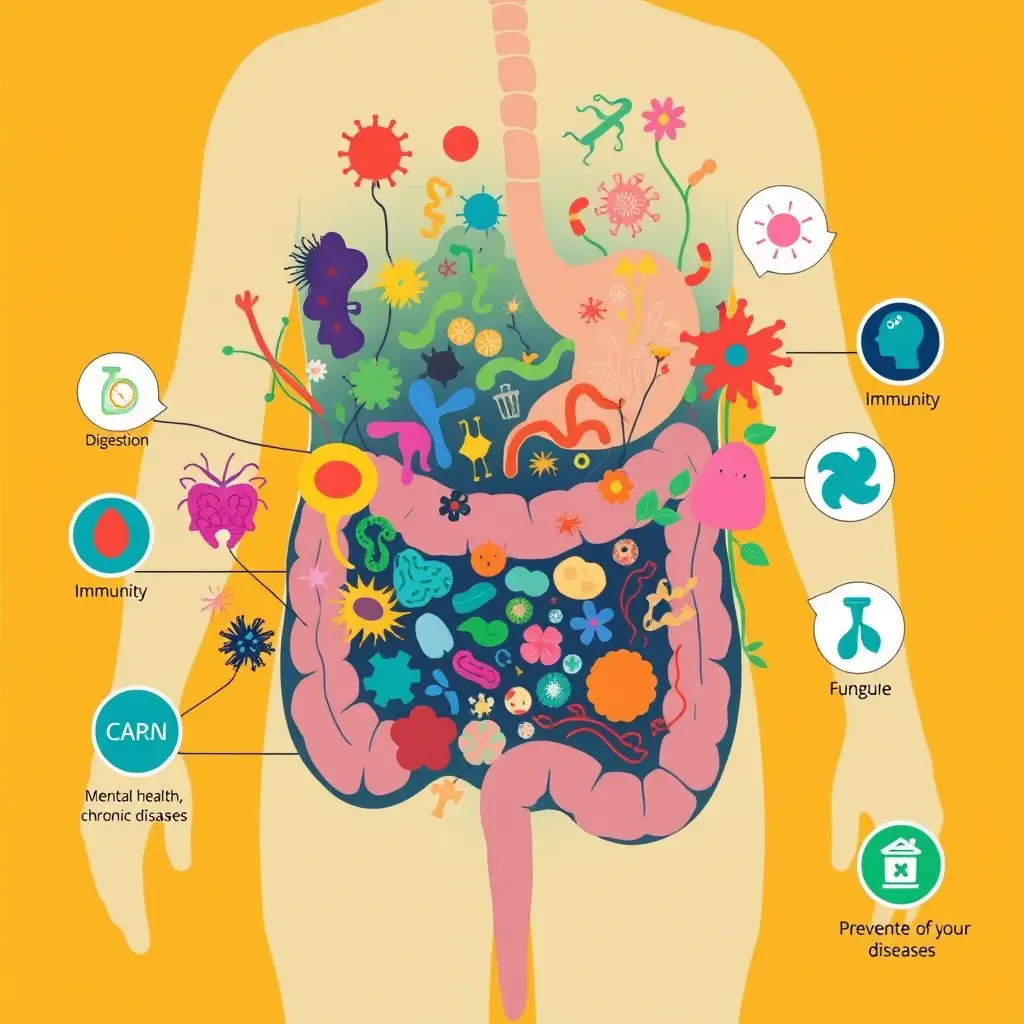Your gut is more than just a digestive organ,it’s a complex ecosystem that plays a crucial role in your overall health. The gut microbiome, a community of trillions of bacteria, viruses, and fungi, influences everything from digestion to immunity, mental health, and even chronic disease prevention.
In this blog, we’ll explore the importance of gut health, how your microbiome affects your well-being, and practical tips to maintain a healthy gut.

Why Is Gut Health Important?
Research has shown that a balanced gut microbiome is essential for:
Digestion & Nutrient Absorption – Beneficial bacteria help break down food, produce essential vitamins (like B12 and K), and enhance nutrient absorption.
Immune Function – Nearly 70% of your immune system resides in your gut. A healthy microbiome helps fight pathogens and reduces inflammation.
Mental Health (The Gut-Brain Axis) – The gut produces neurotransmitters like serotonin (90% of it is made in the gut!) and GABA, which influence mood and cognitive function.
Weight Management – Certain gut bacteria are linked to metabolism and obesity.
Disease Prevention – Imbalances in gut bacteria (dysbiosis) are associated with conditions like IBS, diabetes, heart disease, and autoimmune disorders.
Signs of an Unhealthy Gut
How do you know if your gut is out of balance? Watch for these symptoms:
Bloating, gas, constipation, or diarrhea
Frequent infections or weak immunity
Food intolerances
Unexplained weight changes
Skin issues (eczema, acne)
Mood swings, anxiety, or depression
Chronic fatigue

How to Improve Your Gut Health
1. Eat a Diverse, Fiber-Rich Diet
Prebiotics (food for good bacteria): Garlic, onions, leeks, asparagus, bananas, oats.
Probiotics (live beneficial bacteria): Yogurt, kefir, sauerkraut, kimchi, miso, kombucha.
Polyphenol-rich foods: Berries, dark chocolate, green tea, red wine (in moderation).
2. Reduce Sugar & Processed Foods
High sugar and artificial additives can feed harmful bacteria, leading to dysbiosis.
3. Stay Hydrated
Water supports mucosal lining in the intestines, aiding digestion.
4. Manage Stress
Chronic stress disrupts gut bacteria. Try meditation, yoga, or deep breathing exercises.
5. Get Enough Sleep
Poor sleep alters gut bacteria, affecting metabolism and immunity.
6. Exercise Regularly
Physical activity promotes microbial diversity.
7. Avoid Overuse of Antibiotics
Antibiotics kill both bad and good bacteria—use them only when necessary.
Final Thoughts
Your gut microbiome is a vital player in your overall health. By making mindful dietary and lifestyle choices, you can nurture a thriving gut ecosystem, leading to better digestion, immunity, and even mental clarity.
Want personalized advice? Consult a healthcare provider or nutritionist to optimize your gut health!
References
The Gut Microbiome and Its Role in Health – Nature Reviews Microbiology
https://www.nature.com/articles/nrmicro.2018.23Gut-Brain Axis: How the Microbiome Influences Mental Health – Harvard Health Publishing
https://www.health.harvard.edu/blog/gut-brain-connection-2018Diet, Gut Microbiota, and Immune Responses – Frontiers in Immunology
https://www.frontiersin.org/articles/10.3389/fimmu.2018.00001Probiotics and Prebiotics for Gut Health – Mayo Clinic
https://www.mayoclinic.org/healthy-lifestyle/consumer-health/expert-answers/probiotics/faq-20058065Impact of Sleep on Gut Microbiome – Sleep Medicine Reviews
https://www.sciencedirect.com/science/article/pii/S1087079217300962